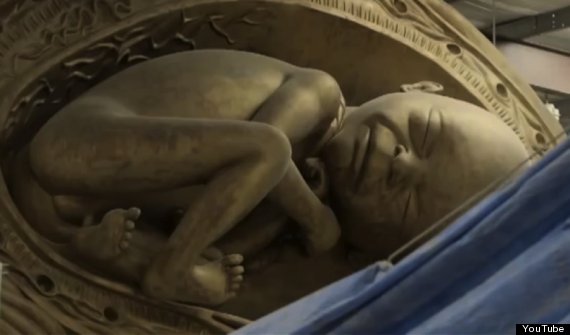When Damien Hirst erected 14 massive sculptures depicting the stages of human fetal development in Doha, Qatar, we can't say that we were surprised. The controversial British bad boy has a knack for staging over-the-top art spectacles (see here, here and here), so his arrangement of 216 tons worth of bronze babies was hardly his most explosive exhibition.
What is surprising, however, is that the artwork, titled "The Miraculous Journey," has garnered praise from an unlikely group of conservative admirers. According to Independent Catholic News, Pro-Life supporters are smitten with Hirst's homage to the gestation process, calling it, among other things, "art in service of truth."
"Whether the artist intended it or not, and I believe he did, the sculptures take a pro-life view," Canadian Catholic Lou Iacobelli wrote on his blog. "Consider the last piece which is a huge sculpture of the born baby. Visually it says that we cannot hide this human life away and destroy it."

"We congratulate the Qatari authorities on their eye-catching public initiative," ICN quotes Anthony Ozimic, communications manager of the Society for the Protection of Unborn Children (SPUC), as saying. "Educating the public about the wonderful reality of human development from conception through to birth is a vital means of saving unborn children."
Hirsts statues have also made their way to the pages of the National Catholic Register and National Right To Life News, as well as blogs like Personhood Education and Ex Umbris Et Imaginibus. So, was Hirst's intention to create a marketably Pro-Life image?
We reached out to the artist via email, but had yet to hear back at the time of publication. The artist remains pretty secular in an artist statement on his website: "Ultimately, the journey a baby goes through before birth is bigger than anything it will experience in its human life. I hope the sculpture will instill in the viewer a sense of awe and wonder at this extraordinary human process."
The sculptures were placed in Qatar, a country known for its conservative culture and adherence to strict Islamic traditions. The organization responsible for commissioning the works, now on view in front of the city's Sidra Medical and Research Center, explained their reasoning to The New York Times:
"To have something like this is less daring than having a lot of nudity," said Sheikha al Mayassa Hamad bin Khalifa al-Thani, 30, chairwoman of the Qatar Museums Authority. "There is a verse in the Koran about the miracle of birth. It is not against our culture or our religion.”